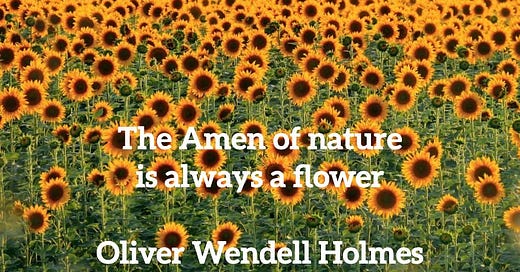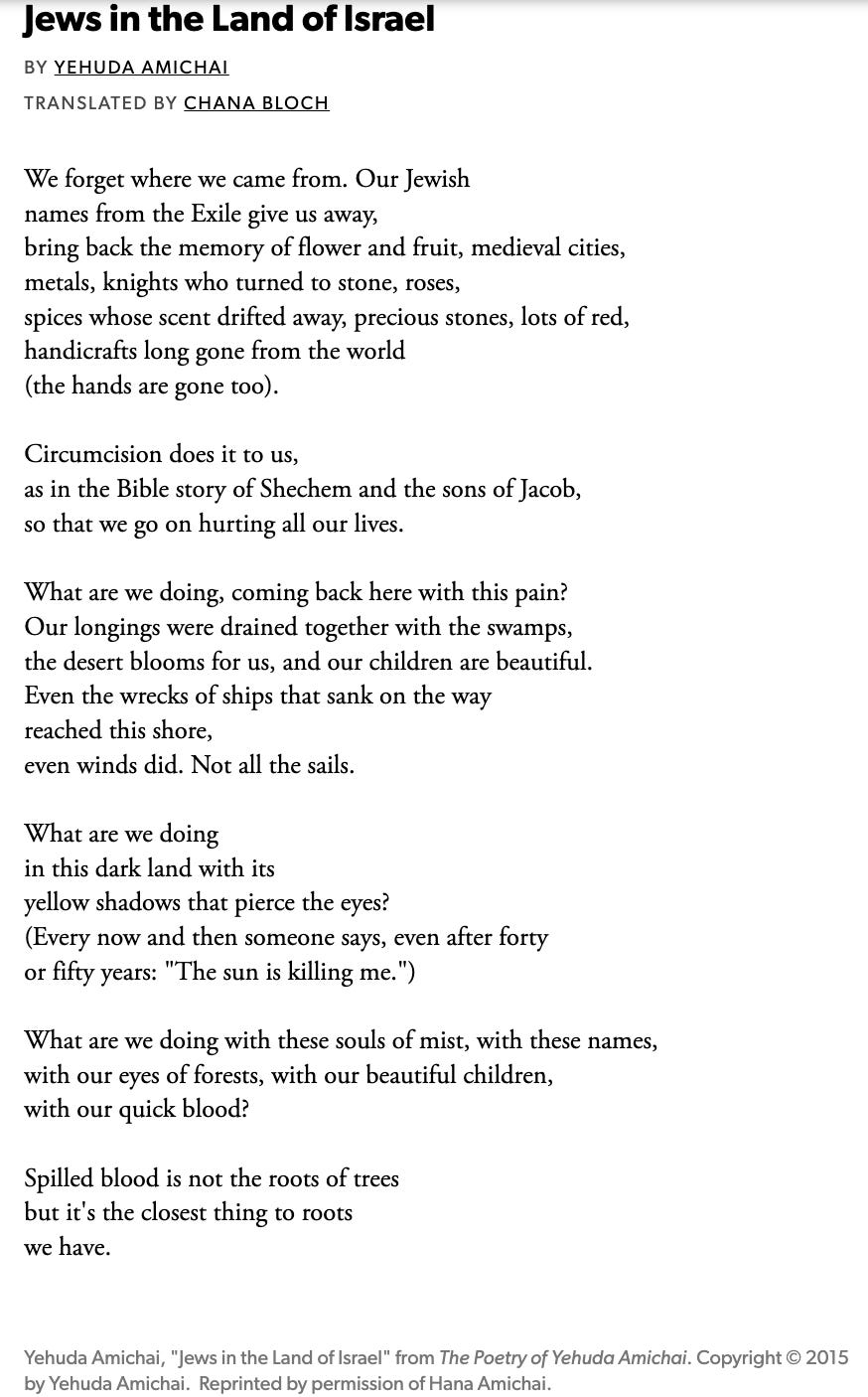On Tu B'Shevat, Which Takes Precedence? The Land of Israel or the Earth?
Tu B'Shevat reminds us of our escalating obligations. For when the current fighting finally ends, we will still be left with a planet that just completed its hottest year by far.
Above: A field of sunflowers in Slovakia, viewed from my congregation’s tour bus following a visit to Auschwitz.
Tu B'Shevat, the Jewish Arbor Day, which falls on Wed. night and Thursday, has shape-shifted in a number of ways over the past two millennia, with vastly different but complementary messages, some more universal and others more tied to the Jewish people.
To see how the themes of Tu B'Shevat interact, see this explainer, The Four Faces of Tu B'Shevat
For Jews and other lovers of Israel, the urgency of this moment does not give us the luxury of choosing between the national Zionist emergency and the global environmental crisis. We need to prioritize both. That can be accomplished by channeling the tight spiritual bond that Jews have for the Land and directing that passion outward, toward others who also share bonds, both with that Land and with the entire planet. We can’t afford to shirk one for the sake of the other. Just because many question recent controversial Israel-related comments by Greta Thunberg, for instance, now is not the time to take those frustrations out on the planet, not when we’ve just concluded the warmest year on record.
Back in 1939, Martin Buber wrote an open letter to Mahatma Gandhi, responding to accusations that have a familiar ring for us today: Are Jews in the Land of Israel foreign interlopers invading an alien country (as the British were doing in both Palestine and India back then), or are they returning to cultivate their ancestral, sacred soil? Buber's entire letter is well worth reading, but the excerpt below responds powerfully (OK maybe it’s just a tad patronizing) to the "colonialist" question:
Our settlers do not come here as do the colonists from the Occident to have natives do their work for them; they themselves set their shoulders to the plow and they spend their strength and their blood to make the land fruitful. But it is not only for ourselves that we desire its fertility. The Jewish farmers have begun to teach their brothers, the Arab farmers, to cultivate the land more intensively; we desire to teach them further: together with them we want to cultivate the land —to “serve it,” as the Hebrew has it. The more fertile this soil becomes, the more space there will be for us and for them. We have no desire to dispossess them: we want to live with them.
Buber is demonstrating that the Zionist yearning for return to the land can pay dividends for their non-Jewish neighbors as well.
A.D. Gordon was a pioneer of early Zionism, known for expressing the organic connection of the people to the land. See this excerpt from one of his essays, and especially how sees in that profound attachment a potential to benefit all of humankind. A national rebirth with universal implications.
We are engaged in a creative endeavor the like of which is not to be found in the whole history of mankind: the rebirth and rehabilitation of a people that has been uprooted and scattered to the winds. The center of our national work, the heart of our people, is here, in Palestine. Here something is beginning to flower which has greater human significance and far wider ramifications than our history-makers envisage, but it is growing in every dimension deep within, like a tree growing out of its own seed. Here, in Palestine, is the force attracting all the scattered cells of the people to unite into one living national organism. The more life in this seed, the greater its power of attraction. . . . We seek the rebirth of our national self, the manifestation of our loftiest spirit, and for that we must give our all.
A.D. Gordon, “Our Tasks Ahead,” 1920
My point here is that there is no need to dilute or sacrifice that mystical bond Jews feel toward the Land of Israel - but the urgent task now is to express that deep connection in ways that can help to save the earth.
And that begins with a nod to Palestinians who wish for coexistence.
Here are two love poems to the Land. They should be seen as complementary - not competitive - visions. See first a sobering reflection by the Palestinian national poet, Mahmoud Darwish (1942-2008). It could easily have been written by Yehuda Amichai (1924-2000), perhaps Israel's greatest poet - who in fact wrote the equally sobering poem directly below it.
Sunflowers on Kibbutz Re'im
For both poets, the natural beauty dissolves into a nightmarish vision of a burning, parched, bloodied landscape, unable to bear the weight of human suffering that overshadows its beauty. A bucolic natural setting becomes a hellscape, which is precisely what happened last October at the rave adjacent to Kibbutz Re'im, a place of bursting color in springtime, which succumbed to bursts of gunfire on that terrible day. A pre-October 7 website explains that initially, the lovely, peaceful kibbutz was called “Tel Re'im” (Tel – Hill, Reim – Friends) after the nearby hill called in Arabic, “Tel al-Jama” (the hill of the friends). And then 364 were massacred.
We who love this land so much now need to help heal it. We who love the planet so much also need to heal it. If we work toward both, perhaps a valley of tears can become a hill of friends once again. To build and be rebuilt, in the Gaza Envelope, and in Gaza itself.
Psalm 24 begins :
Rashi comments that the word "aretz" implies the Land of Israel, and "tevel" the entire world. Our narrow focus on nurturing the Holy Land must not end at its borders, but lead to the preservation of the entire world. Poetically, this verse is a classic synecdoche, where, in Rashi's view, the part, Israel, stands in for the whole, the planet.
Our planet is on loan from God and we are all its custodians. A pure devotion to just one sliver of territory, no matter how singularly holy, is pointless, since God sees the whole world as being to some degree sacred and in every respect fragile and in need of care.
After all, the seeds that fly in the wind know no national borders. The sunflowers are everywhere, in the killing fields of eastern Europe and the killing fields of Re'im.
Not everything flying into northern Israel these days is a Hezbollah rocket. It has been estimated that over 500 million migratory birds fly over Israel every year. A large number of them make a lengthy stop in Israel's Hula Valley. They know no national borders. Over 450 species of birds are navigating these crossroads of the sky, including these cranes.
Tu B'Shevat reminds us of our escalating obligations. For when, God willing, the current fighting finally ends, the hostages are released and Hamas's reign of terror ends, we will still be left with a planet that just completed its hottest year by far.
We need to remind ourselves that this sacred, beautiful and tragic Land is holy to Israelis and Palestinians - and to cranes and sunflowers too.









